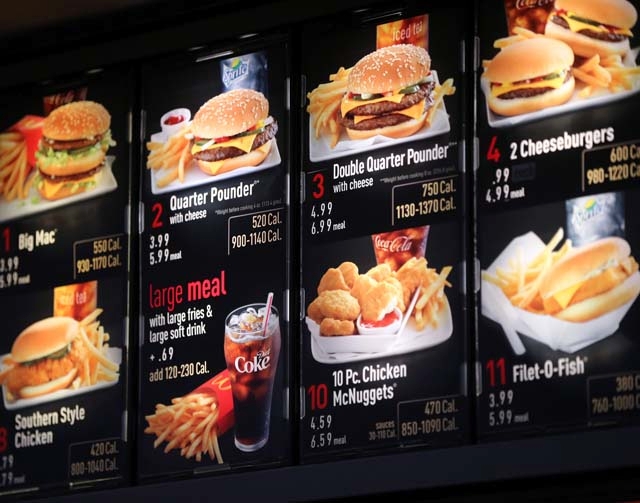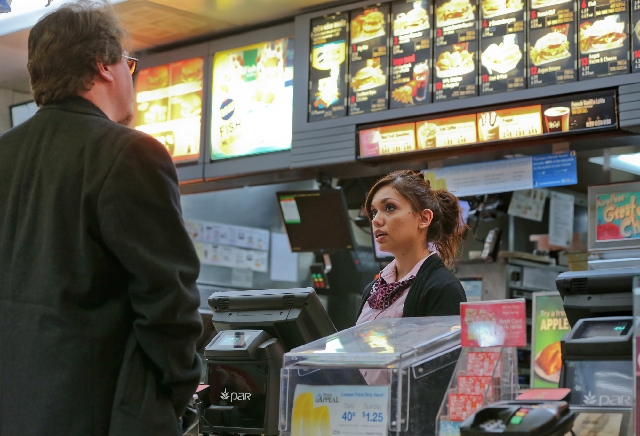How many calories? Nevada legislator wants signs to say


CARSON CITY — If a Nevada lawmaker has her way, patrons of most chain restaurants soon will be able to find out the number of calories in that hamburger or pizza slice they just ordered with a quick glance at the menu.
New federal rules are being developed that will require retail food establishments with 20 or more locations to post calorie information on their menus and menu boards, including at drive-thru lanes.
But Assemblywoman Lucy Flores, D-Las Vegas, wants Nevada to require the calorie information to be posted sooner rather than later. She also wants the posting requirements to apply to Nevada restaurant chains of 10 locations or more rather than the 20 locations that will be covered in the rules being prepared by the federal Food and Drug Administration.
The goal is to get people to make healthier choices as a way to battle the nation’s obesity epidemic.
Opponents argued that the federal rules, including limiting the calorie reporting information to chains of 20 restaurants or more, are sufficient, and they called the bill unnecessary.
There is also evidence to suggest the calorie information does not change people’s eating habits.
A yearlong study published in January 2011 in the American Journal of Preventive Medicine found customers’ orders were unaffected by calorie information.
Flores’ bill is not the only one in the Legislature this session aimed at chain restaurants and the food they serve.
Assemblyman Harvey Munford, D-Las Vegas, has proposed charging a nickel tax on fast food items of 500 calories or more, again to fight obesity.
FLORES’ NUTRITION QUIZ
This past week Flores testified in support of her Assembly Bill 126, which she called “a smart and effective way to produce good public health policy.”
Flores gave members of the Assembly Health and Human Services Committee a quick nutrition quiz by asking which had more calories: a Burger King Premium Alaskan Fish Sandwich or a McDonald’s Big Mac. The answer was the fish sandwich at 590 calories versus 540 for the hamburger.
The same question was posed for a California Pizza Kitchen Thai Crunch Salad or a Chili’s Smokehouse Bacon Triple-The-Cheese Big Mouth Burger with Jalapeño Ranch Dressing. The answer was the salad at 2,115 calories versus 2,040 for the burger.
Flores quizzed the lawmakers to show that it isn’t always easy to figure out which menu item has fewer calories.
Flores’ bill would codify new federal regulations being developed under the Patient Protection and Affordable Care Act in Nevada. But her measure would also lower the threshold for reporting to 10 restaurants in the same chain operating in Nevada.
The new federal rules will require only calorie information, not other nutritional information, to be posted.
But the federal rules, which will be imposed in Nevada as part of the FDA regulations, will require a prominent statement on menus and menu boards that says additional nutrition information will be available upon request, including calories from fat, total fat, saturated fat, cholesterol, trans fat, sodium, total carbohydrates and other information.
Calories aren’t the only important nutrition information, but they do relate to living a healthy lifestyle and making good food choices, Flores said.
SOME RESTAURANTS ALREADY DOING IT
Patrons of some restaurants, including McDonald’s, already see this information. The restaurant chain announced last fall that it was posting the information on its menus and menu boards voluntarily.
But Robert Smith of Dayton, who had just finished two 450 calorie Sausage McMuffin With Egg sandwiches at the South Carson Street McDonald’s in the capital, said he doesn’t pay attention to the calorie counts, and “I don’t think anyone else does either.”
Smith, who works as a farrier, said he didn’t even notice the calories were posted on the restaurant menu.
While posting calorie information is probably a good idea, Smith said requiring the information at grocery store delis might drive up the cost of the food or even put some of them out of business.
Sean McBriarty, a Carson City resident who ordered a salad, said he does look at the calorie information although it doesn’t influence what he eats.
“At least I know what I’m doing to myself,” he said.
McBriarty said he thinks listing calories on restaurant menus is a good idea, although there is the question of whether the information is accurate.
Flores said at the committee hearing that the Nevada Restaurant Association was able to identify only one grocery chain that serves retail food that would be affected by her proposal to require the information to be posted by chains of 10 restaurants or more rather than the federal threshold of 20.
Her proposal was supported by representatives of the American Heart Association and American Cancer Society, who testified in support because of the obesity epidemic and for the long-term health benefits of eating healthier foods.
CRITICS CALL BILL PREMATURE
But several groups opposed the bill for being premature and for being an unnecessary duplication of the federal rules.
Warren Hardy, a lobbyist representing the Nevada Restaurant Association, said the federal rules are adequate and the state does not need to legislate in this area.
“We absolutely support the public education portion of this,” he said.
But the association participated in developing the federal rules partly to avoid situations in which states would enact their own varying rules, Hardy said.
Lea Tauchen, representing the Retail Association of Nevada, opposed applying the rules to chains of 10 restaurants or more in Nevada because of the effect on grocery store delis and bakeries.
The number of grocery store chains that would be affected is still being researched, but there is at least one in Northern Nevada, she said.
The deli/bakery combinations have as many as 500 to 1,000 items that would need to be nutritionally analyzed, Tauchen said. The cost would range from $500 to $1,000 per item, she said.
The number of 20 locations was picked at the federal level specifically to exempt small business, Tauchen said.
“The consumer would ultimately suffer by the increased price and in the reduction in the selection of products available to them,” she said.
Convenience stores may also be covered in the new federal regulations, but there is a move to exempt them.
Peter Krueger, representing the Nevada Petroleum Marketers & Convenience Store Association, said about eight convenience store chains, including Terrible Herbst, have more than 10 but fewer than 20 locations in Nevada and so would be required to comply under the bill for hot foods prepared in the store.
Most convenience stores don’t have menu boards, he said.
He asked where the calorie information would be posted on a hot dog roller machine.
“We could put a sleeve on the hot dog as it goes around and round,” Krueger said.
“The federal legislation really should stand supreme,” he said.
Contact Capital Bureau reporter Sean Whaley at
swhaley@reviewjournal.com or 775-687-3900.












